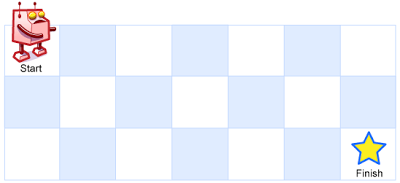A robot is located at the top-left corner of a m x n grid (marked 'Start' in the diagram below).
The robot can only move either down or right at any point in time. The robot is trying to reach the bottom-right corner of the grid (marked 'Finish' in the diagram below).
Now consider if some obstacles are added to the grids. How many unique paths would there be?

An obstacle and empty space is marked as 1 and 0 respectively in the grid.
Note: m and n will be at most 100.
Example 1:
Input: [ [0,0,0], [0,1,0], [0,0,0] ] Output: 2 Explanation: There is one obstacle in the middle of the 3x3 grid above. There are two ways to reach the bottom-right corner: 1. Right -> Right -> Down -> Down 2. Down -> Down -> Right -> Right
思路:动态规划
dp[i][j]表示到达(i, j)的路径数, 对于一般情况,由于只能向右或者向下,dp[i][j] = dp[i - 1][j] + dp[i][j - 1]
1 class Solution { 2 public: 3 int uniquePathsWithObstacles(vector<vector<int>>& obstacleGrid) { 4 int m = obstacleGrid.size(); 5 if (m == 0) { 6 return 0; 7 } 8 int n = obstacleGrid[0].size(); 9 vector<vector<long long> > dp(m + 1, vector<long long>(n + 1, 0)); 10 if (obstacleGrid[0][0] == 0) //左上角为0,说明可以达到这个点,方法数为1 11 dp[0][0] = 1; 12 else 13 return 0; 14 for (int j = 1; j < n; j++) { 15 if (obstacleGrid[0][j] == 0) 16 dp[0][j] = dp[0][j - 1]; 17 else 18 dp[0][j] = 0; 19 } 20 for (int i = 1; i < m; i++) { 21 if (obstacleGrid[i][0] == 0) 22 dp[i][0] = dp[i - 1][0]; 23 else 24 dp[i][0] = 0; 25 } 26 for (int i = 1; i < m; i++) { 27 for (int j = 1; j < n; j++) { 28 if (obstacleGrid[i][j] == 0) { //如果(i, j)这个点没有障碍,那么达到这个点的路径数为(i-1, j) + (i, j - 1) 29 dp[i][j] = dp[i - 1][j] + dp[i][j - 1]; 30 } else { 31 dp[i][j] = 0; 32 } 33 } 34 } 35 return dp[m - 1][n - 1]; 36 } 37 };